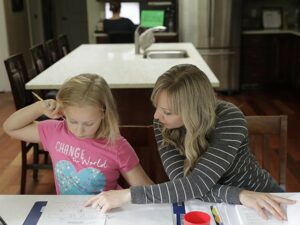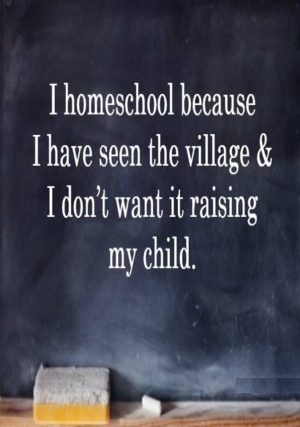 Do you look on with astonishment at Antifa and other extreme groups rioting and shouting “death to America?” How could all this happen? Where did all these young people come from who hate the US?
Do you look on with astonishment at Antifa and other extreme groups rioting and shouting “death to America?” How could all this happen? Where did all these young people come from who hate the US?
Chances are they caught this belief from our public school systems. If you live in California, it’s right in your face. Some are calling it out.
We’ve talked about why homeschooling is an excellent choice from an academic, independence, and character-building standpoint in previous articles. In this discussion, we’ll talk about protecting your children from indoctrination.
Distance learning is starting to show some of the cracks with schooling.
Reports are starting to surface of parents uncomfortable with the political patina of their children’s online classrooms. Police visited one family because a boy’s BB gun was visible behind him in an online classroom session, and the teacher reported the “gun” to the police.
Another teacher caught a glimpse of a 12-year old’s Nerf gun, and instead of asking him or the parents about it, she reported it to the sheriff. The child was accidentally suspended for a week for having a toy gun at home during a Zoom class!
One teacher expressed that he has to be more careful with his words now that parents can listen to online class sessions. Some school districts have gone so far as to ask parents to sign a disclaimer that they will not watch class sessions with their children to protect other children’s privacy in the online classroom.
RELATED: Letter threatens arrest over 12-year-old’s missed Zoom class
Could it be that teachers, their unions, and school administrations are concerned about being exposed as rhetoric spreaders in the classroom?
Have we forgotten our children are our responsibility?
Rearing them, teaching them, caring for them, and loving them is our responsibility. In this country, it seems we have abdicated that responsibility and ceded it over to the state. We believe the government owes our children free education, free medical care, and even free meals. I don’t know about you, but I suspect there is a string attached when I hear something is free. That string is the ability to mold our children’s minds.
I’m not comfortable with people I don’t know taking full responsibility for my children’s care, their thoughts, and their beliefs. Don’t we suspect that this current civil unrest was born in the classroom some years ago? While “it takes a village” has a nice familial ring to it, do we want the state to be that village?
Do we want our children to have our values or someone else’s?
Infuse into your home education a worldview rooted in critical thinking and morality, whether it be the Principle Approach, or an education rich in the study of the US constitution and western philosophy, or Socratic reasoning, or a faith-based curriculum.
If you’re a person of faith, you will undoubtedly want your children to share your faith and not that of a secular system. Teach your children how to think and help them to develop good character.
 I know many teachers who take their jobs seriously, who go to work faithfully every day and try to do a good job. The best of them end up being frustrated by a system that doesn’t support them and is heavily influenced by the teacher’s unions and political correctness. They don’t want to be responsible for both their children and yours. They want to educate your children in reading, writing, and arithmetic. Still, their latitude in teaching has been severely limited by common core standards, teaching to the test, and political correctness.
I know many teachers who take their jobs seriously, who go to work faithfully every day and try to do a good job. The best of them end up being frustrated by a system that doesn’t support them and is heavily influenced by the teacher’s unions and political correctness. They don’t want to be responsible for both their children and yours. They want to educate your children in reading, writing, and arithmetic. Still, their latitude in teaching has been severely limited by common core standards, teaching to the test, and political correctness.
Their job performance is now dependent upon how much your children learn from the required curriculum and how well they can perform on a standardized test. Children spend countless hours preparing for these tests that show only memorized information regurgitated onto the bubble-filled page. Do we want children who can memorize or do we want critical thinkers?
Students are encouraged, “get a good night’s sleep, and eat a good breakfast” on test days, as if this is not important on every other school day.
The teacher’s ability to advance to the next performance level or pay grade depends on your child’s test performance. That’s a lot of pressure for both the teacher and your child. Don’t we want our kids to be able to read, write, and do the math, and when they’ve learned that, to be able to think critically?
As a parent, you have tremendous influence and responsibility
You create an atmosphere of helping your children understand and make sense of the world around them by just listening and having a conversation. Could you do that over breakfast? How about around the dinner table?
If you don’t have a meal together as a family, start now. It’s a time to reconnect with each other, discuss the day’s events, or sort out difficulties someone is having. Mealtime is a time when the family knows everyone will listen to each other.
 I’ve seen variations on the family meal. Some families discuss the events of the day. Others will pose a question and ask everyone’s opinion before the parent gives his/her view. Others recite memorized poetry or Bible verses, and others use the time to pray. Mealtime can become a sacred time – a time for the family to lift one another, work through difficulties, and talk about what was essential to each one.
I’ve seen variations on the family meal. Some families discuss the events of the day. Others will pose a question and ask everyone’s opinion before the parent gives his/her view. Others recite memorized poetry or Bible verses, and others use the time to pray. Mealtime can become a sacred time – a time for the family to lift one another, work through difficulties, and talk about what was essential to each one.
We didn’t realize how important mealtime was until my son had a group of friends over. When it was dinnertime, my son called them to the table. They said they’d come in to eat later. My son explained that we all eat together in our house. Reluctantly, they all came in to eat. At the end of the meal, my son’s friends said they enjoyed eating together. The only time they did that in their homes was during the holidays. I think they wished their own families did the same.
You have the power to create a safe and comforting place in your home at mealtime, not just for your children but also for their friends. Even if the food is simple, or God forbid, scarce, don’t discard the opportunity to reconnect.
What about homeschooling?
The decision of whether to homeschool – or if they’re qualified to do so – has been a difficult one for many parents. I’ve read that parents are concerned about the cost of homeschooling, hiring a tutor or a teacher for their micro-school or learning pod of children. They are desperate to keep working and earning to pay someone else to educate their children and maintain their same lifestyle.
If you can afford to hire a teacher, even part-time, to educate your and your friend’s kids in a one-room schoolhouse in your converted garage, more power to you. Many don’t have that financial flexibility to hire someone else to teach.
My advice to you would be to join forces with other parents, share the load, learn to teach your children, and teach them to learn from you. Here are some tips to help you do so.
* Be flexible. Some parents may be able to teach during part of the day, and some may be available for tutoring at night. Another parent may teach archery, bushcraft skills, gardening, food preservation, or backpacking on the weekend.
* Be creative. Pull together something that works for you and the other families. A kitchen table is all you need.
* Divide the work fairly. I belonged to a babysitting co-op, and we created laminated cards to exchange babysitting services. One card for one hour of babysitting for up to two children was the baseline. We all started with the same number of cards and exchanged and received them as we used and provided babysitting to the other co-op members. Parent educators could design a similar system—one card per adult for two hours of teaching for up to four children.
Using an established system, you could help one another in other ways. Perhaps one family gardens, another knows how to do car maintenance, another has an abundance of chicken eggs, and another has skills in the medical field.
Could you exchange what you have or know for what another family has or knows? Could you save money by exchanging for needs?
Think about it because this kind of system could help you navigate not only homeschooling, but also a collapse in the supply chain, rapid inflationary pressures on food or medicine, or securing neighborhoods from civil unrest.
Why do I push homeschooling?
Homeschooling can form the baseline for all other thought processes. Homeschooling creates solid values in your children, supporting one another through thick and thin, and finding others who are like-minded. Homeschooling can be your lifeline, not just for your children, but also for your entire family. It’s also the best way I know to have a stable and fulfilling relationship with your grown children.

Keep them at home…
Homeschooling is just part of a mindset that is undergirded by a belief in self-sufficiency. And by self-sufficiency, I don’t necessarily mean going it all alone. I mean figuring out a way to make it a win-win for others with a similar mindset to you and getting what both you and they need. Some people find a group of like-minded people in a church, within your own family, and others find them on a blog like this. Find your people and figure out a way to help one another, not just in homeschooling, but also in doing life together.
I used to say it was time to leave this country if homeschooling was outlawed because I believed that was the final step in indoctrination and in limiting our freedom. While it is not outlawed, it may become more and more regulated. I urge you to take this time to explore your options, to understand what you want for your family’s future, and to take action now to achieve that.
I believe we have a window of opportunity that may close in the years ahead. Learn to protect your children from the indoctrination of others who don’t have their best interests in mind.
Written by Linnea Johnson for The Organic Prepper ~ September 11, 2020
